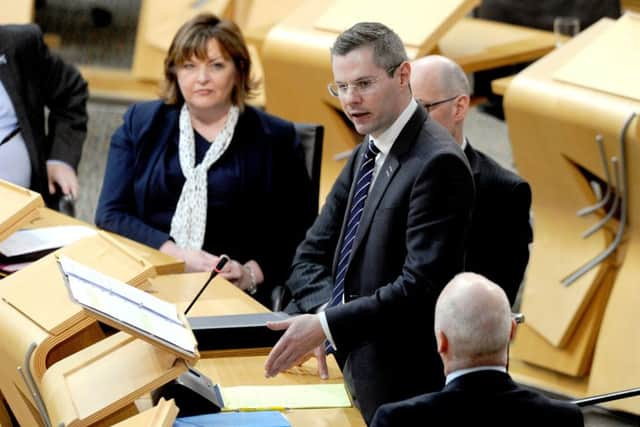OBR warns tax divide could harm Scottish economy
Robert Chote, chairman of the Office for Budget Responsibility (OBR), said higher taxes in Scotland risked seeing people shift their tax residency south of the Border.
Another senior figure at the OBR said the effect could already be taking place, cutting hundreds of millions of pounds from Scottish tax revenues.
Advertisement
Hide AdAdvertisement
Hide AdThe Scottish Conservatives said the comments would put further pressure on First Minister Nicola Sturgeon to introduce a cut for higher-rate taxpayers to match the one announced by Chancellor Philip Hammond in Monday's Budget.


Mr Hammond revealed a promised rise in tax thresholds would take place a year earlier than planned, with workers entering the 40p tax rate on earnings above £50,000 from April next year. In Scotland, the 2018-19 higher rate of 41p kicks in at £43,431. The proposed bands for 2019-20 will be presented in the draft Scottish budget on 12 December.
Mr Chote and his colleague Andy King were giving evidence to the Commons Treasury select committee following Monday's Budget and were asked about the growing gap between tax rates in Scotland and the rest of the UK.
In September, it was revealed that Scotland's tax revenue in 2016-17 was much lower than estimated '“ £550 million less based on Scottish Fiscal Commission (SFC) forecasts, and £700m lower than the OBR's estimate.
The SFC said the difference was down to 'data issues', with estimates based on samples of taxpayer records rather than real data. However, Mr King suggested the gap could be down to 'anticipatory behaviour', with taxpayers already shifting their tax residency out of Scotland ahead of higher rates coming into effect north of the Border.
He said: 'There could be any number of administrative or other issues going on here, or there could be something going on in the real world.
'Prior to this tax being fully devolved, there was lots of debate about putting up the higher rate, and in order to be flagged as a Scottish taxpayer you have to tell HMRC that you are resident in Scotland for more than half of the year.
'If you're a relatively high income individual with a property in Scotland and one elsewhere in the UK, writing to HMRC to say, '˜I live more than half the year in London rather than Scotland is not difficult'.'
Advertisement
Hide AdAdvertisement
Hide AdMr King added: 'It's a particularly significant risk for the Scottish Government because if someone changes their address, the Scottish Government loses all of that income tax. It does not leave the UK, so our UK-wide forecast is less vulnerable to this type of activity.'
Mr Chote later spoke of 'potential economic behavioural responses' in relation to income tax divergence.
Asked by Colin Clark, the Conservative MP for Gordon, if there was a risk of an 'enormous economic effect' from the UK cutting taxes while Scotland keeping rates the same, the OBR chairman said: 'Yes, and the thing you're interested in there is not only is there a genuine economic effect, but also does it encourage people who would not otherwise change the amount of time they live in one place versus the other, to report it in that sort of way.'
Mr Clark said: 'This evidence [from the OBR] will pile more pressure on Nicola Sturgeon and the SNP to pass on UK tax breaks for hard-working Scots. If that does not happen, then clearly there is a risk that people who have the option to do so may choose to pay taxes south of the Border instead.
'And if the gulf in income tax rates between England and Scotland continues, then the wider Scottish economy could be seriously hamstrung in the longer term. Ultimately, this will mean '¦ less money to spent on vital local services.'
Meanwhile, new figures have confirmed the Scottish economy grew faster than the rest of the UK in the second quarter. GDP rose by 0.5 per cent north of the Border, while the UK as a whole measured 0.4 per cent between April and June.
Finance Secretary Derek Mackay said: 'It's great news that the positive GDP data published last month '“ showing Scottish GDP growing and outpacing growth in the UK as a whole '“ has been confirmed.
'However, uncertainty relating to the form and timing of agreement for leaving the EU remains a key concern for many sectors of the economy.
'The Scottish Government will continue to use all the powers it has to boost the economy and ensure our economic potential is realised.'